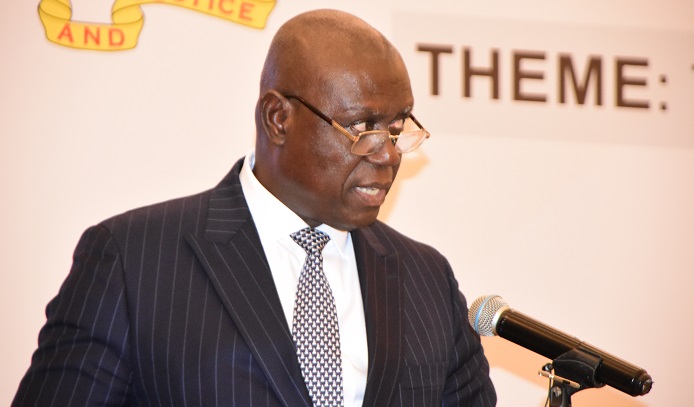
A seven-member panel of the Supreme Court yesterday unanimously dismissed an interlocutory injunction application filed by three National Democratic Congress (NDC) Members of Parliament to restrain the Ghana Revenue Authority (GRA) from collecting the Electronic Transactions Levy 2022.
The court, presided by Justice Nene Amegatcher said that greater hardship would be on the state if it upholds the application.
The panel included Justices Professor Nii Ashie Kotey, Mariama Owusu, Gertrude Torkornoo, Yonny Kulendi, Lovelace Johnson and Prof. Henrietta Mensah Bonsu.
Messrs Haruna Iddrisu, the Minority Leader, Mahama Ayariga, MP for Bawku Central and Okudzeto Ablakwa, MP for North Tongu sued the Attorney General (AG) over the implementation of the levy on May 1.
Their counsel, Mr Godwin Kudzo Tameklo, in moving his application for interlocutory injunction told the seven-member panel presided over by Justice Nene Amegatcher that Ghanaians would suffer greater hardship if the respondent was not stopped.
He asked the court to injunct the AG until the final determination of the matter which borders on the constitutionality of the passage of the levy by the majority side of Parliament.
Mr Tameklo argued that the state would not be able to reimburse Ghanaians in the event the court ruled in favour of his clients.
Mr Godfred Yeboah Dame, the A-G opposed the motion and said it was totally incompetent.
He contends that the applicants failed to raise reasonable cause of action to warrant the granting of the interlocutory application.
But the court, speaking through Justice Amegatcher said that in dismissing the application, it took into consideration the nature of the reliefs sought, greater loss and inconvenience or loss, the nature of the legislation which is under attack and whether public interest would be affected by the grant or otherwise of the application for interlocutory injunction.
The court said it relied on section 37 of the Evidence Act to note that official Acts are presumed to have been regularly performed.
“We are therefore enjoined by law pending the determination of the substantive matter to presume the regularity of the Act passed by Parliament.”
“Applicants submit in Paragraph 19 of their statement of case that irreparable damage will be done. It is not clear how they came to this conclusion and can only concede that it was just a conjuncture,” the court stated.
The court ordered the GRA to “keep accurate records of the amounts deducted so that at the end of the substantive matter nobody will he disadvantaged.”
The court said while GRA can do a refund should the substantive case be won, the GRA cannot recover the levy if the substantive case is lost.
“In our opinion greater hardship will be on the state and the balance of power tilts in favour of the state.”
The plaintiffs wanted the court to declare that on the authority of the Supreme Court case of Justice Abdulai v. Attorney-General, dated March 9, 2022, the constitutional quorum for decision-making and voting in Parliament within the meaning and intent of Article 104(1) of the 1992 Constitution is 138 Members of Parliament present in the Chamber of Parliament out of the 275 Members of Parliament; and not 136 Members of Parliament present in the Chamber of Parliament.
The plaintiffs’ asked for a declaration that in accordance with Article 104(1) of the 1992 Constitution of Ghana and on the authority of the Supreme Court case of Justice Abdulai v. Attorney-General, when the Speaker of Parliament put the question for the second reading of the Electronic Transfer Levy Bill, 2021, Parliament lacked the required quorum ‘to vote on the motion before the House.
They want the court to hold that the purported vote on the motion for the second reading of the Electronic Levy Transfer Levy Bill, 2021 by the 136 Members of Parliament was in contravention of Article 104(1) and therefore null, void and of no effect whatsoever.
A declaration that in accordance with Article 104(1) of the 1992 Constitution of Ghana and on the authority of the recent Supreme Court case when the Speaker of Parliament put the question for the Consideration of the Electronic Transfer Levy Bill, 2021 to the house, Parliament lacked the required quorum to vote on each clause of the Electronic Transfer Bill, 2021 before the House.
The MPs appealed to the Supreme Court to declare that on account of relief (d) the purported vote by the 136 Members of Parliament on each clause of the Electronic Transfer Bill, 2021 was in contravention of Article 104(1), and therefore null, void and of no effect whatsoever.
They further asked an order of the court setting aside the purported passage of the Electronic Transfer Levy Bill, 2021, by the 136 Members of Parliament of the Majority Caucus present in ‘the Chamber of Parliament on the March 29, 2022 as being unconstitutional, null and void.
BY MALIK SULLEMANA







